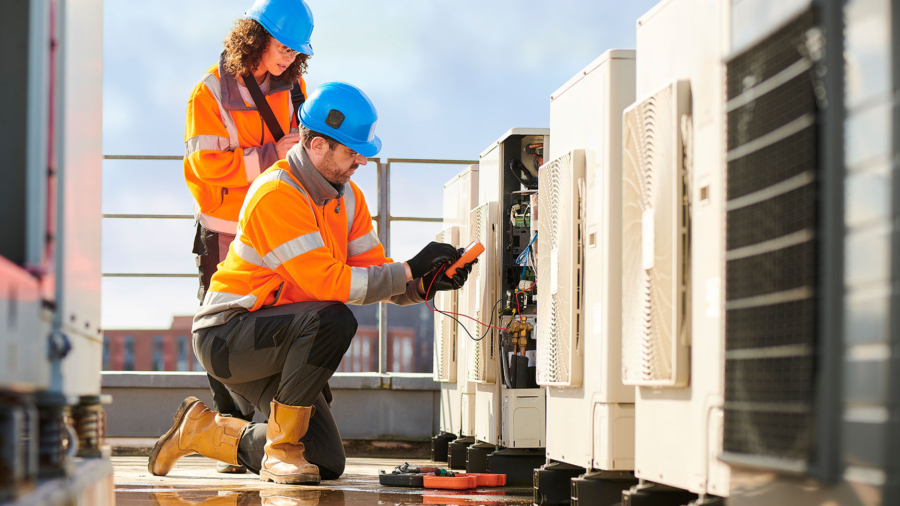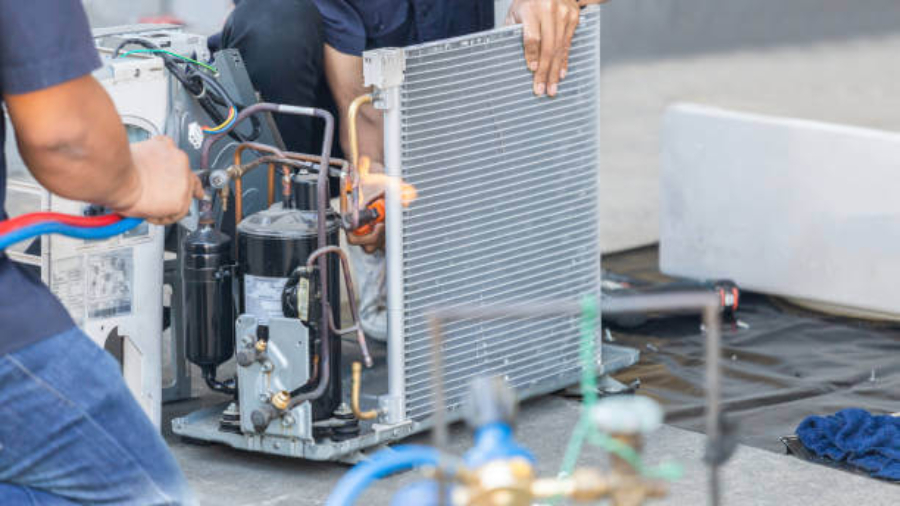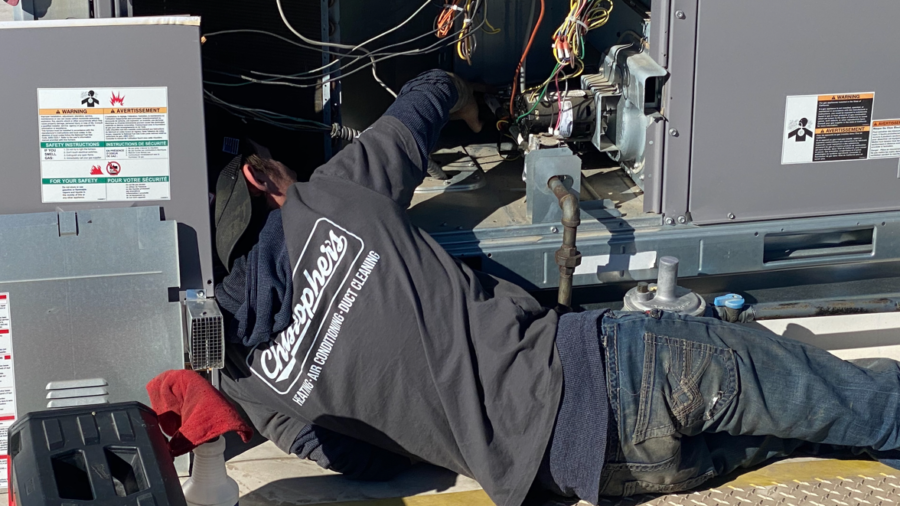What is Radiant Heating?
Radiant heating is a form of heating that works by warming objects in a room, rather than the air. This type of heating system can be installed in floors, walls, or ceilings and works by emitting infrared radiation that directly heats the people and objects in a space. This method of heating is known for providing consistent, comfortable warmth without the need for noisy fans or blowers. In addition to being energy efficient, radiant heating is also known for its ability to distribute heat evenly throughout a room, making it a popular choice for many homeowners and businesses. While it’s most commonly used in residential and commercial buildings, radiant heating can also be found in outdoor spaces, such as patios or garages. Overall, radiant heating offers a modern and efficient approach to keeping spaces warm and comfortable.
What are Conventional HVAC Systems?
Conventional HVAC systems consist of several components, including a central unit, ductwork, and vents. The central unit contains a heater, air conditioner, and fan, which work together to regulate the temperature and airflow throughout the building. The ductwork distributes the heated or cooled air to different rooms through the vents.
In contrast, radiant heating/cooling systems use a network of pipes or electric coils installed in the floors, walls, or ceilings to radiate heat or cool air directly into the living spaces.
The pros of traditional ducted HVAC include its ability to quickly and evenly heat or cool a space, while the cons include potential energy losses through leaks in the ductwork and the dispersal of dust, allergens, and odors.
Key Differences Between Radiant Heating and Conventional HVAC Systems
When it comes to heating a home or building, there are different options to consider. Two popular choices are radiant heating and conventional HVAC systems. Both systems have their unique advantages and disadvantages. In this section, we will explore the key differences between radiant heating and conventional HVAC systems, including their installation process, energy efficiency, comfort levels, and overall cost. Understanding these differences can help homeowners and building managers make an informed decision when it comes to choosing the best heating system for their specific needs.
Temperature Control
Radiant floor heating systems maintain a constant temperature by circulating warm water through a network of pipes installed beneath the floor. The system is operated by a thermostat that regulates the water temperature, ensuring that the floors stay consistently warm throughout the day and night. This method of heat distribution allows for even warmth in every corner of the room, eliminating cold spots and ensuring comfort in all areas.
During an electricity outage, radiant systems provide residual warmth due to the thermal mass of the flooring material. This means that even when the power is out, the floors will continue to emit heat, keeping the space comfortable for an extended period.
The efficiency of temperature control with radiant floor heating is highly effective, as the system can maintain a consistent temperature with minimal fluctuations. This level of control not only ensures comfort but also results in energy savings by reducing the need for frequent adjustments.
The consistent heat distribution of radiant floor systems offers numerous benefits, including improved indoor air quality, reduced allergens, and enhanced comfort. It also eliminates the need for radiators or vents, creating a more aesthetically pleasing and spacious environment.
Cost/Installation
For existing homes with minimal structure changes, low-profile wood panels or aluminum heat-transfer plates are excellent options for installing radiant heating. These options can be laid directly over existing subfloors and provide a low-profile finish that minimizes the impact on floor height.
For homes with floors with joists below, wire rebar can be used to install radiant heating. This method involves securing the rebar to the floor joists and then pouring a thin layer of concrete over the rebar to create a thermal mass for heat distribution.
In new construction with a concrete slab, foam board insulation and knobbed mats are commonly used for radiant heating installation. Foam board insulation is placed on the slab to prevent heat loss downward, while knobbed mats are laid over the insulation, providing a surface for the radiant heating system to be installed.
When considering radiant heating installation options, it’s important to take into account the specific needs of the space and the existing infrastructure. Each method offers its own benefits and considerations, and consulting with a professional installer can help determine the best option for the specific project.
Comfort Level
Radiant systems offer superior comfort levels due to their ability to provide the ideal heating curve for the human body. Unlike traditional forced-air heating systems, which heat the air and then circulate it throughout the room, radiant heating keeps the heat low where it provides the greatest comfort. This ensures that the temperature near the floor is warm, while the air higher up remains cooler – mimicking the body’s natural heat distribution.
Additionally, radiant heating offers a rapid response to heating needs, providing instant warmth as soon as it’s turned on. This allows for quick adjustments to the temperature, ensuring optimal comfort for homeowners.
Furthermore, radiant heating contributes to improved air quality by eliminating the need for circulating allergens and viruses. Without the blowing of air, dust, pet dander, and other particles are not agitated and dispersed throughout the room. This results in a cleaner and healthier indoor environment.
Efficiency of System
Radiant floor heating systems offer exceptional efficiency due to their ability to quickly reach the designated temperature and maintain it consistently. Unlike forced-air systems, which can take a while to warm up a room, radiant floor heating delivers heat directly through the floor, resulting in a faster response time. Additionally, the slow cooling nature of the system means that once the desired temperature is reached, it stays that way for longer periods, reducing the need for continuous energy consumption.
This efficiency is further enhanced by the use of hydronic systems, which harness the 3,500 times greater energy transportation capacity of water compared to air. This means that radiant floor heating can effectively distribute heat throughout a space using less energy. Sustainable heat sources such as solar thermal or geothermal can also be easily integrated with hydronic systems, increasing their eco-friendliness and reducing overall energy costs.
Radiant floor heating allows for zoning, meaning that only the necessary spaces can be heated, resulting in further energy savings. With its quick response time, slow cooling, and high energy efficiency, radiant floor heating is a cost-effective and sustainable option for keeping spaces comfortable.
Advantages of Radiant Heating Systems
Radiant heating systems offer several advantages over traditional forced-air systems, making them an increasingly popular choice for home and commercial heating. These systems work by directly heating the objects in a room, rather than just the air, which results in more even and comfortable warmth. In addition to their energy efficiency and cost savings, radiant heating systems also provide a quieter and cleaner alternative to traditional heating methods. This section will explore the various advantages of radiant heating systems, from their ability to reduce energy consumption and improve indoor air quality to their versatility in different building designs and applications.
Installation Costs
The installation costs for radiant heating options can vary depending on the specific requirements of the home. Retrofitting an existing home with radiant heating can range from $10,000 to $20,000, depending on the size of the home and the complexity of the installation. Installing radiant heating in specific rooms, such as bathrooms or kitchens, can cost anywhere from $5,000 to $10,000 per room. Tying the system into potable water supplies can add an additional $2,000 to $5,000 to the overall cost. Other potential expenses to consider include outside ventilation, which can add another $1,000 to $3,000 to the total installation cost.
When it comes to HVAC systems, the range of costs can also vary depending on the location and specific parameters of the house. In different locales, the installation of top-of-the-line components for an HVAC system can range from $9,000 to $15,000. Factors that can affect the cost include the size of the home, the efficiency of the system, and any additional features or upgrades. It is important to obtain quotes from reputable HVAC contractors to get an accurate estimate for the installation costs of radiant heating and HVAC systems.
Ease of Use and Maintenance
Electric radiant heat systems are designed to be incredibly easy to use and require minimal maintenance. To maintain their ease of use and minimal maintenance requirements, it is important to follow a few simple steps.
Firstly, it is essential to understand that electric radiant heat systems are essentially maintenance free. Unlike traditional heating systems, they do not require regular maintenance or servicing. This alone ensures that they maintain their ease of use and minimal maintenance requirements.
Additionally, these systems are designed to maintain a constant temperature, providing consistent warmth without the need for adjustments or frequent monitoring. This feature not only adds to their ease of use but also reduces the need for maintenance.
Furthermore, electric radiant heat systems are safe to use, eliminating the need for safety checks or frequent inspections. This factor also contributes to their minimal maintenance requirements and ensures their ongoing ease of use.
To maintain the ease of use and minimal maintenance requirements of electric radiant heat systems, it is important to simply follow the manufacturer’s guidelines, keep the system clean and free of obstructions, and ensure it is not subjected to any physical damage.
Energy Efficiency
Radiant heating systems offer several benefits in terms of energy efficiency. Unlike forced-air systems, which can lose energy through ductwork and rely on blowing hot air to transfer heat, radiant heating systems transport energy more effectively by directly warming objects and people in a space. This results in a more efficient use of energy, as less is wasted through heat loss and the need to continuously heat and reheat the air.
Another advantage of radiant heating systems is their potential for pairing with sustainable heat sources, such as solar panels or geothermal energy. This allows for a more environmentally friendly and cost-effective heating solution, reducing reliance on traditional energy sources.
Furthermore, radiant heating systems can be more efficient by not requiring unused spaces to be heated. Since they warm objects and people directly, there is no need to heat entire rooms that are not in use. Additionally, radiant heat naturally rises, warming both toes and the air simultaneously, providing a more even and comfortable heat distribution.
Advantages of Conventional HVAC Systems
Conventional HVAC systems have been the go-to choice for heating, ventilation, and air conditioning in buildings for decades. These systems offer a number of advantages that make them a popular option for both residential and commercial spaces. From their ability to provide consistent and reliable temperature control to their cost-effective installation and maintenance, conventional HVAC systems continue to be a practical and efficient choice for meeting the comfort needs of any indoor environment. Let’s explore some of the key advantages of conventional HVAC systems.
Wide Range of Options Available
There is a wide range of installation options available for radiant heating systems, catering to different types of flooring and subfloor construction. One popular option is the use of low-profile wood panels, which provide a sturdy base for the radiant pipes while minimizing the increase in floor height. Aluminum heat-transfer plates are another effective option, as they are designed to quickly and evenly distribute heat across the floor surface.
For concrete slab installations, tying the radiant pipes to wire rebar is a common practice, allowing for secure placement within the concrete. Additionally, foamboard insulation can be used to improve energy efficiency and reduce heat loss in concrete slab installations.
Knobbed mats are another versatile option for radiant heating, particularly for already poured concrete floors. These mats feature raised knobs that securely hold the radiant pipes in place, making them a convenient choice for retrofitting existing floors with radiant heating.
Ability to Cool as Well as Heat a Room
HVAC systems are equipped with various features and functionalities that allow for both cooling and heating of a room. Dual-function systems are designed to provide both cooling and heating capabilities, utilizing heat pumps to transfer heat from one area to another. During the cooling mode, the heat pump removes heat from inside the room and releases it outside, while during the heating mode, it extracts heat from the outside air and transfers it inside.
Thermostat settings play a key role in enabling the seamless transition between cooling and heating modes. Users can easily select their desired temperature and mode, and the thermostat will automatically switch between cooling and heating functions as needed. HVAC systems also utilize a refrigerant cycle to facilitate the cooling process and a heating element for warming up the air. This combination of features allows for an efficient and effective way to maintain a comfortable temperature within a room regardless of the outdoor conditions.
Disadvantages of Radiant Heating Systems
Radiant heating systems come with several disadvantages, particularly when it comes to their efficiency and suitability for certain spaces. Electric radiant heating systems, in particular, have limitations in terms of their capacity to efficiently heat large areas, making them less effective for larger spaces. Additionally, certain types of flooring, such as thick carpeting or highly insulated materials, can impede the effectiveness of radiant floor heating.
Moreover, electric radiant heating systems can be more costly to operate compared to other heating systems, leading to higher operating costs in the long run. There are also concerns about potential exposure to electromagnetic fields with electric radiant heating, which may cause health problems in the long term. These drawbacks make radiant heating systems less versatile and cost-effective for some homeowners and businesses. It’s important to carefully consider these limitations before investing in radiant heating systems for your property.
Contact Christopher’s Heating & Cooling for Your HVAC Needs
Are you currently debating between a radiant heating system and a conventional HVAC setup? For practical, no-nonsense advice tailored to your specific situation, consider reaching out to Christopher’s Heating and Cooling. With a wealth of industry experience, our team specializes in providing personalized guidance to help you make well-informed decisions. Whether you’re leaning towards the efficiency of radiant systems or prefer the reliability of traditional HVAC, our seasoned professionals can assess your home’s unique needs. Avoid navigating this decision solo—get in touch with Christopher’s Heating and Cooling for reliable insights that will optimize your home for comfort and efficiency. Your home deserves the most pragmatic solutions, and Christopher’s is here to provide just that.





